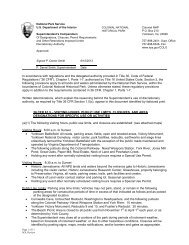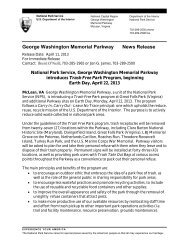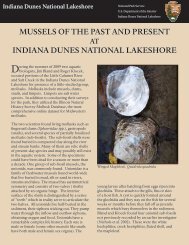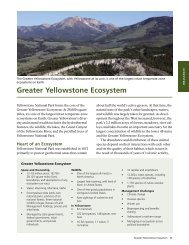National Park Service U.S. Department of the Interior
National Park Service U.S. Department of the Interior
National Park Service U.S. Department of the Interior
Create successful ePaper yourself
Turn your PDF publications into a flip-book with our unique Google optimized e-Paper software.
The Gilded Age and Country Places<br />
Age," is no longer seen as particularly precise in describing <strong>the</strong> dramatic shifts <strong>of</strong> <strong>the</strong> post-Civil<br />
War era and <strong>the</strong> complexity <strong>of</strong> responses to <strong>the</strong>m. The past forty years has witnessed a shift in<br />
emphasis in <strong>the</strong> historical literature from elite politics and business on a national scale to social<br />
history with its focus on <strong>the</strong> topical analysis <strong>of</strong> subjects like race, class, and gender, and mass<br />
developments such as urbanization and consumerism. These issues find little relevance in <strong>the</strong><br />
artificial periodization as defined by Twain's "gilded age" with its limited reference to machine<br />
politics and wasteful consumption. A brief survey <strong>of</strong> recent American history texts reveals that<br />
historians have turned to an organizational interpretation that in part results from three<br />
influential works, Robert Wiebe's The Search for Order, 1877-1920 (1967), Alfred D. Chandler's<br />
The Visible Hand (1977), and Alan Trachtenberg's The Incorporation <strong>of</strong> America; Culture and<br />
Society in <strong>the</strong> Gilded Age (1982). 5 Thus, students learn about "The New Industrial Order,"<br />
"Economic Change and <strong>the</strong> Crisis <strong>of</strong> <strong>the</strong> 1890s," "The Emergence <strong>of</strong> Modern America," and<br />
"<strong>National</strong>izing <strong>the</strong> Republic." 6 These broader categories encompass and integrate a greater<br />
range <strong>of</strong> people into <strong>the</strong> historical narrative and open up new sets <strong>of</strong> questions about <strong>the</strong><br />
changes generated by an industrializing society and <strong>the</strong> diverse responses to <strong>the</strong>m.<br />
Both <strong>of</strong> <strong>the</strong>se analytical structures are useful in studying <strong>the</strong> Vanderbilts and Hyde <strong>Park</strong>.<br />
Older interpretations <strong>of</strong> <strong>the</strong> Gilded Age fit because <strong>of</strong> <strong>the</strong> Vanderbilts' elite economic status. Yet<br />
<strong>the</strong>ir wealth also relied on <strong>the</strong> new organizational society, thus demonstrating both <strong>the</strong><br />
complexities <strong>of</strong> periodization and <strong>the</strong> continued utility <strong>of</strong> older interpretations when<br />
syn<strong>the</strong>sized with new works <strong>of</strong> historical analysis. Even though Frederick Vanderbilt's fortune<br />
was a third generation inheritance, he none<strong>the</strong>less served as a director <strong>of</strong> <strong>the</strong> New York Central<br />
Railroad and forty-three o<strong>the</strong>rs. 7 Historians credit <strong>the</strong> railroads as <strong>the</strong> key to <strong>the</strong> establishment<br />
<strong>of</strong> a national market and as <strong>the</strong> pioneer in <strong>the</strong> organizational innovations <strong>of</strong> big business. 8<br />
Railroad practices contributed to labor unrest and political movements such as <strong>the</strong> Granger and<br />
Populist movements. The progressive movements that sought reform in <strong>the</strong> face <strong>of</strong> corporate<br />
hegemony also worked to <strong>the</strong> advantage <strong>of</strong> industrialists who lobbied <strong>the</strong> government for less<br />
radical legislation favorable to <strong>the</strong>ir interests. 9<br />
5 Robert H. Wiebe, The Search for Order, 1877-1920 (New York: Hill and Wang, 1967); Alfred D.<br />
Chandler, Jr., The Visible Hand, The Managerial Revolution in American Business (Cambridge, MA: The<br />
Belknap Press, 1977); and Alan Trachtenberg, The Incorporation <strong>of</strong> America; Culture and Society in <strong>the</strong><br />
Gilded Age (New York: Hill and Wang, 1982).<br />
6 James West Davidson, et. al. Nation <strong>of</strong> Nations, A Narrative History <strong>of</strong> <strong>the</strong> American Republic, 3 rd ed.<br />
(New York: McGraw Hill, 1998); Randall Woods and Willard Gatewood, America Interpreted, A Concise<br />
History with Readings (Ft. Worth, TX: Harcourt Brace & Company, 1998); George Brown Tindall and<br />
David E. Shi, America, A Narrative History (New York: W. W. Norton, 1996); and Bernard Bailyn, et. al.,<br />
The Great Republic, 4 th ed. (Lexington, MA: D.C. Heath and Company, 1992). See also John M. Murrin,<br />
et. al., Liberty, Equality, Power, A History <strong>of</strong> <strong>the</strong> American People, 2 nd ed. (Ft. Worth, TX: Harcourt Brace<br />
& Company, 1996); and John Mack Faragher, et. al., Out <strong>of</strong> Many, A History <strong>of</strong> <strong>the</strong> American People, 2 nd ed.<br />
(Upper Saddle River, NJ: Prentice Hall, 1997).<br />
7 Edwin Hoyt, The Vanderbilts and Their Fortunes (Garden City, NY: Doubleday & Company, 1962), 353.<br />
8 Porter, 10-11. See also Chandler and Olivier Zunz, Making America Corporate, 1879-1920 (Chicago:<br />
University <strong>of</strong> Chicago Press, 1990), both <strong>of</strong> which describe and interpret <strong>the</strong> rise <strong>of</strong> middle management in<br />
large industries such as railroads and insurance.<br />
9 Steven J. Diner, A Very Different Age, Americans <strong>of</strong> <strong>the</strong> Progressive Era (New York: Hill and Wang, 1998),<br />
49. See also Gabriel Kolko, The Triumph <strong>of</strong> Conservatism: A Re-interpretation <strong>of</strong> American History, 1900-<br />
1916 (New York: Free Press, 1963); and James Weinstein, The Corporate Ideal in <strong>the</strong> Liberal State: 1900-<br />
1918 (Boston: Beacon Press, 1968).<br />
2

















